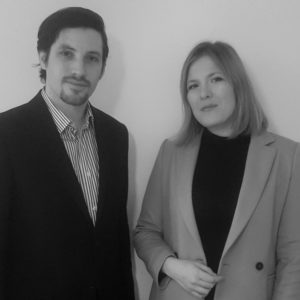

Sébastien Lachaussée & Elisa Martin-Winkel
Shooting in the USA : keys of understanding
The « American Dream » is tough and many are the French producers and directors who want to make a film in the US, such as Michel Hazanavicus for « The Artist » or more recently Guillaume Canet for « Blood Ties »; We can also cite the French producer Nicolas Chartier, co-founder of the American production company Voltage Pictures. For these directors and even more for these producers it is then necessary to adapt to the American production system whose rules and practices are very different from French film production.
A specific movie production organization
First we have to note that in the United States we must distinguish between the majors (represented by the Motion Picture of America) and the independent producers. The majors largely dominate the film market and if the independent producers produce an important volume of films they encounter difficulties to finance their projects and above all to distribute their films. Thus, independent films often seek a financing abroad, in particular from local distributors. Moreover, the films produced by independent producers represent only a very small part of the US box office. For example in 2014 no independent film was represented in the first 25 US box-office successes.
Furthermore, the management of films budgets is different in the US and doesn’t consist in a single overall budget. Indeed the films budgets are divided in two parts: an Above the Line budget that includes the individuals involved with the creative works: actors, producers, directors and a Below the Line that gathers the technicians who perform the physical production of a given film including film editing.
However, regarding the artistic expenditures we can note that the American copyright is an intellectual property system different from the French system and rather in favour of the producers. Indeed in application of the « work made for hire » status, the copyright of the works carried out on behalf of a producer by a screenwriter or a film director are assigned to such producer solely because of the command and payment of such works and does not require a separated copyright assignments.
It is important to emphasize that organize a filming in the United States arises difficulties and entails obligations for the producers: on the first hand the presence of unions has a great influence on the filming conditions and filming permits represent a significant cost, on the other hand film financing can be difficult even if private funds and tax incentive systems exist.
Compliance with trade unions provisions
In the US the film and audio-visual production actually works as an industry, not as the French cultural exception; Therefore there is a very strong union presence and the producers wishing to film in the United States must join a trade union of producers, which, beyond the scope of the financial contribution (about 16,000 dollars / year) implies for them the respect of many obligations. Also, wages and working conditions are particularly strict: number of employees and quotas of national workers, precise definitions of jobs and wages … All kind of circumstances to which the French producers are not accustomed.
Indeed, the trade union system implies extremely significant costs for producers, especially because the number of technicians required in the staff is high but also because the wages of such technicians are high. This problem often appears regarding independent productions and Nicolas Chartier, French Producer and co-founder of the American independent film production company Voltage Pictures, that notably produced « Killer Joe » or « Dallas Buyers Club », stated in that sense « I don’t get that the guys who pull cables make $100,000 a year», such wages leading to very high production costs. The French producer Richard Grandpierre noticed on this topic that re-write some scenes of « Un bonheur n’arrive jamais seul » directed by James Huth to locate them in New York instead of Montreal has led to an additional production cost of 500,000 euros.
Especially, the trade union system exists as opposed to majors and to the strength of film producers, therefore it is not possible as sometimes during French films’ production to circumvent working conditions such as wage cuts or overtime paid as lump-sum. On this matter French producer Alain Attal highlighted the rigidity of the US system and thus noted that, « As the unions were built facing the all-mighty power of Hollywood studios, their rules are not made to independent films « .
Finally, unions affect all film occupations, not just technicians. Thus unions, such as the Writers Guild of America or the Directors Guild, whose strength is well established, and who impose strict working conditions, represent directors and writers. We can particularly note that the remuneration of authors and directors are not really negotiable notably because they are paid with a fixed compensation (as opposed to French authors’ proportional remuneration).
However, our statement must be nuanced, because in fact most unions provide successive levels of minimum wages, according to the film’s budget and provide some « Low Budget agreement” Thus, generally for films with budgets under 500,000 dollars constraints are low, and in some cases direct negotiations with artists or technicians are possible.
Costly & intricate Filming permits
If in France administrative permissions are required to shoot a film, in particular to allow the parking of production vehicles or to interrupt the traffic, such permits are rarely subject to a fee and are not necessary when the shooting takes place in a private location. In the United States these authorizations are mandatory for both public and private locations, and can be extremely costly. Moreover it is understood that without authorization and in case of an administrative control the filming must stop immediately and fines will apply.
Administrative procedures are cumbersome; moreover filming authorization procedures vary among states and cities, further complicating the work of the producers. To illustrate this situation we will limit ourselves to the examples of Los Angeles & New York’s procedures.
In Los Angeles a 625 dollars administrative fee is required for at most 10 locations and 14 days shooting period, moreover additional fee may apply for shooting in parks, beaches or public roads. Film L.A commission will determine if you need a monitor, fire or public safety officer on set. If any of these personnel are required, the producer is responsible for paying their set hourly wage and overtime.
The series producers Gavin Polone related that to take a footage on Rodeo Drive in Losa Angeles the shooting permit fee was up to 7 500 dollars and that most of the shops on Rodeo Drive were also asking to be paid to authorize the filming of their shop fronts.
In New York all filming permits must be submitted to the Mayor’s Office of Media and Entertainment and requires payment of a 300 dollars fee. Shooting in state properties requires payment of a location fee up to 3200 dollars. Producers must be careful: filming in parks implies to have the authorization of the park and of the Mayor’s Office.
In all these situations to obtain a filming permit producers must subscribe to liability insurance for the benefit of the city and up to 1M. The amount may be increased in case of use of vehicles or in the case of special effects. The cost of such insurance is to be added to the filming expense accounts.
It is to ne noted that if filming in the US occurs financial costs it is mostly the administrative work that can be tiresome, thus French producers must carefully consider this administrative work if they wish to locate a filming in the United States.
Film financing: private funds & tax credit
Independent producers cannot rely on TV or distributors pre-sales because US movies are sold to US distributors only when they are achieved, as a consequence the financing of an independent movie in the US may be difficult.
Thus, unlike the French producers who rely on national support and pre-sales, American producers are self-financing or may turn to private funding. On this matter, the producer Hunter Gray explained that with his company Verisimilitude « We invest our own money, my partners and I, and we are looking for private capital. (…). There are a number of people willing to invest in cinema as in other activities, their participation is deeply considered, after reviewing the « business plan » ». In this regard it may be noted that the establishment of a tax credit for investors in Section 181 of the Job Creation Act of 2004 have greatly encouraged private investments.
Moreover some film financing funds exist. An example is Endgame Entertainment founded by private investors and oriented in favour of independent production. The fund participated in the financing of “Snowden” directed by Oliver Stone and to be released in May 2016 or to the financing of “An education” directed by Lone Scherfig. Similarly Participant Media notably coproduced “El Ardor” directed by Pablo Fendrik or “The beaver” directed by Jodie Foster and has a $250 million fund with Abu Dhabi’s Imagenation.
In Anglophone projects with an international scope it is indeed clear that the financing often comes from abroad. For illustration purposes: the Chinese entrepreneur Bruno Wu developed the Harvest Seven Stars Media Fund, notably to work with and in the United States. Harven Seven Stars has co-produced several international projects such as « The Immigrant » and contributed to the financing of films as « Blood Ties » directed by Guillaume Canet and « Only God Forgives » directed by Nicolas Winding-Refn.
Filming in the US implies to get in touch with private investors of financing funds and to convince them of the future success of the film allowing a return on investment. This can be difficult, indeed the market of the independent films in the US is severely restricted and only a few independent movies are successful in the American theaters.
On a more positive point of view, the American states are competing to host the filming and accordingly have developed local tax credit systems that can benefit to the producers. Actually over 80% of States offer tax credits measures for filming.
In 2009 California has introduced a tax credit, managed by the California Film Commission, which has recently been extended until 2017. This tax credit has a 100M dollars annual budget and offers to the producers a refund up to 25% of their « Below the line » expenditures. However, this tax credit applies only to films with budgets over $ 1 million and the eligible producers are selected by lottery and as a result the benefit of the tax credit is uncertain. The cities of Los Angeles and San Francisco also offer an additional tax credit for local costs in order to promote the location of filming in their urban conglomeration.
In the same way, New York extended the tax credit managed by the New York state film production for the 2015-2019 period with an annual budget of 420M. This tax mechanism allows the producers to be reimbursed up to 30% of their “Below the line” expenditures and this percentage may be increased in some districts or for film editing works.
However criticisms have been formulated about the effectiveness of these Tax credit regarding the economy of the states. As an example, Robert Tannenwald of the Center on Budget and Policy Priorities believes that these tax credits bring absolutely no benefit to the States in terms of employment and economic activity.
It is why American producers and the Motion Picture Association of America itself regularly fear a decline of the advantage granted to the producers and event a decline of the number of States providing tax credit for filming location.
SHARE THIS ARTICLE
CONTACT
OUR OFFICES
INFORMATION
sl@avocatl.com
PHONE
+33.1.83.92.11.67
Address
121, boulevard de Sebastopol
75002 Paris
5th floor / Staircase A
Follow us :
Newsletter
Please enter your e-mail :
